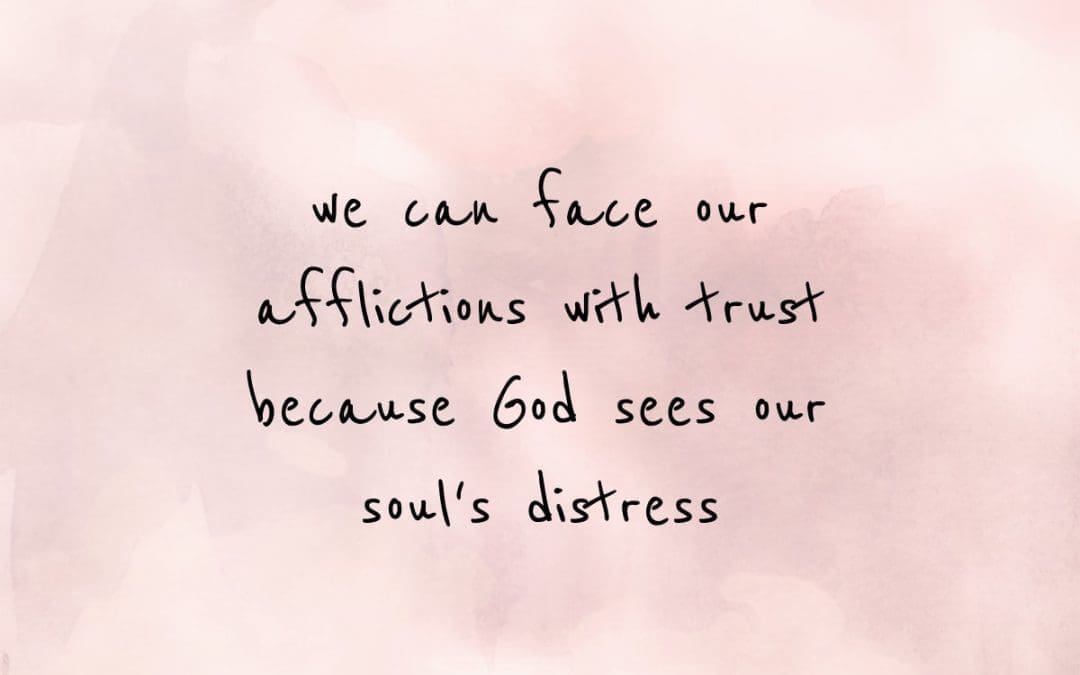Lament is the language that leads us through our sorrow and into praise. Trouble comes to us. We know disappointment and frustration; sorrow and pain. Trusting the Lord and taking hold of courage in the midst of problems grows our faith when we use the language of lament.
The Mourning Song of Lament and Trust
Lament is the song our hearts sing as it mourns our circumstances, as it points our hearts to trust in God’s character, and as it expresses all the pain that we never dreamed we would feel. Lament’s song gives voice to our pain and brings hope to our heart. We begin our lament with the releasing cry of our worries, anxieties, disappointments, anger, and heartbreak. It’s an emptying of everything in our heart: the ugly parts we try and hide, the doubt we cover up with weak faith, and the fear that maybe God won’t come through for us.
As we empty our hearts of all it’s turmoil, we remind ourselves to trust in God. In lament, we confess our trust because our hearts need the reminder of the truth about God’s character. Trust is defined as a “reliance on the integrity, strength, ability, surety, etc., of a person or thing.” (dictionary.com) In one five letter word, we discover a depth of meaning.
Truths for Trust
“Now to him who is able to do far more abundantly than all that we ask or think, according to the power at work within us, to him be glory in the church and in Christ Jesus throughout all generations, forever and ever, Amen.” Ephesians 3:20-21
“The Lord is my rock and my fortress and my deliverer, my God, my rock, in whom I take refuge, my shield, and the horn of my salvation, my stronghold.” Psalm 18:2
“For our sake he made him to be sin who knew no sin, so that in him we might become the righteousness of God.” 2 Corinthians 5:21
“But God’s firm foundation stands, bearing this seal: ‘The Lord know those who are his,’ and, ‘Let everyone who names the name of the Lord depart from iniquity.'” 2 Timothy 2:19
The Pendulum Swings
When we face confusing or hurtful circumstances, our understanding of God’s character goes on trial. Our emotions sway our hearts, like a pendulum, back and forth, back and forth, but a heart that finds its anchor in the Lord of Hosts is the heart that learns the lament. We cry and then we confess trust.
But what happens when our emotions of despair and depression keep swinging to rage and threaten our peace of mind? Confession of trust is more than just saying over and over again, “I trust you, God.” It’s declaring the truth about God while feeling the emotions of despair.
A Look into Psalm 31’s Lament and Trust
If we look at Psalm 31 as an example we see how David confessed his trust in God and declared truth about God’s character. We find David asking God to rescue him while re-remembering God’s character and attributes.
God is a rock of refuge, a strong fortress, refuge, and redeemer. It’s these that David writes for himself and for us in times of trial. David calls God faithful as he commits himself to God no matter what he faces. In verse three, we read an echo of Psalm 23 where God leads and guides. David rejoices because he knows God sees his affliction and knows the distress of his soul and that God’s steadfast love holds him fast.
Lament Confessing Trust
A confession of trust is not an absence of fear or doubt, but the expression of confidence that God is bigger than our circumstances, fears, and sorrow. And not only is he bigger than all that pain, but he is compassionate beyond our wildest imaginations. Even when life hurts and we don’t understand what God is doing or why he is not acting the way we expect, we can trust his heart.
Steadfast Love
His heart is trustworthy because his love is steadfast. By remembering that we cannot be separated from his love, that his love stays the same, that his love isn’t double-minded, or performance based, we can face our afflictions with trust because God sees our soul’s distress and feels compassion towards us. We can be glad in his steadfast love even when we’re facing troubles. This is what grows our trust so that we can confess our trust. Lament leads our heart through sorrow to praise and finally to hope when we cry out our pain and then confess our trust.



